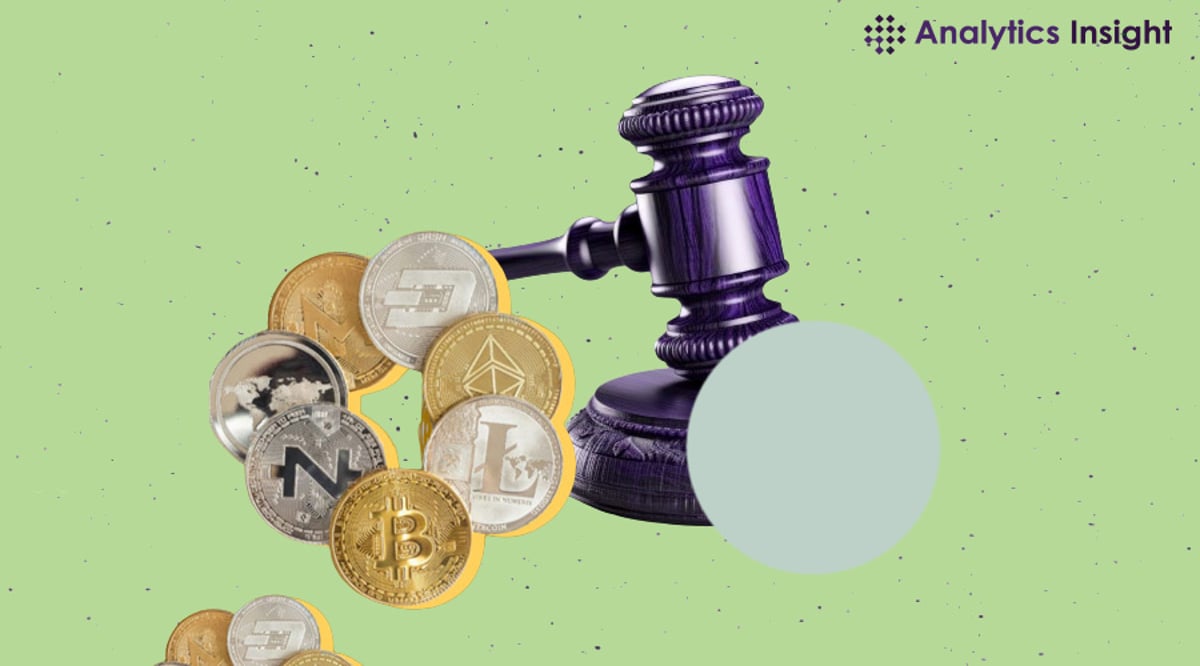Regulation
Best Practices for Crypto Asset Regulation in 2024

There are several compelling reasons to consolidate data in one location. Storing data in a single area makes it easier to access, organize and update information. Keeping data in a single area simplifies the process of retrieving, organizing, and updating information. Information derived from fully integrated databases is more likely to be complete and uniform. People who manage these centralized servers can more easily spot signs of data integrity issues and security threats. Additionally, data aggregation allows applications to operate both cost-effectively and efficiently.
However, the centralization of data in the cryptocurrency landscape also has negative consequences. This includes concentration of power, loss of privacy, reduced accountability and limited competition. This is evident as the Internet has become more centralized over the past quarter century. This shift began when a few companies developed user-friendly platforms. These platforms and websites have made the Internet significantly more accessible. Currently, most online activity is stored in databases controlled by Google, Meta, Amazon, Microsoft and other entities.
Blockchain, the backbone of cryptocurrencies
Blockchain technology uncovers the disadvantages of centralized data storage in crypto exchanges. It offers an alternative channel for structuring digital information. Blockchain technology allows data to be shared across multiple computers within a network. Due to the nature of blockchain, individual computers can verify the authenticity of information received from other “nodes” in a blockchain network. Every time data is shared on a blockchain, the transaction is automatically recorded in a distributed ledger (DL). The DL cannot be changed.
Therefore, taking a global perspective, this article discusses crypto regulation and will move towards the best practices in crypto asset regulation in 2024.
Steering the regulatory landscape for crypto securities
The Securities and Exchange Commission’s (SEC) increased scrutiny of the crypto sector has cast a long shadow. Investors must now balance innovation and compliance, ensuring that their investments in crypto assets do not violate securities laws. This increased scrutiny has sent shockwaves through crypto exchanges and the broader crypto market, creating a need for increased awareness and understanding.
As we navigate this new landscape, let’s first look at the basic principles that determine whether a crypto asset is “good” or “bad” for the SEC.
Understanding the Howey Test and Digital Assets
The Howey Test, stemming from a 1946 Supreme Court decision, serves as a guide for the Securities and Exchange Commission (SEC) to determine which cryptocurrency assets are subject to its regulatory authority. This test, characterized by four key criteria, requires an investment in a joint venture where the primary expectation of return rests on the work of others. Although its relevance in the digital assets arena is widely debated, the Howey Test constitutes a fundamental principle in the regulation of cryptocurrencies, with varying interpretations and enforcement approaches in different courts. For those in the cryptocurrency industry, it is crucial to understand these subtleties.
SEC Position on ICOs and Tokens
The SEC closely monitors initial coin offerings (ICOs) and digital tokens, aiming to protect investors and eliminate deceptive activity. This attention serves as a wake-up call for the cryptocurrency industry to meet cryptocurrency regulatory standards, as the SEC Chairman and the organization as a whole view ICOs as fertile ground for contrarian behavior to ethics without strict regulations for crypto securities.
Therefore, the future of digital asset securities lies in transparency and adherence to rules that protect investors’ interests.
The SEC’s recent actions in the cryptocurrency space underscore its commitment to strengthening defenses against fraud, market manipulation, and unclear reporting. The growth of the SEC’s division focused on digital assets and cyber threats, as well as its emphasis on unregistered securities, mark a period of heightened vigilance.
Notable cases, like the 2023 lawsuit against Ripple Labs, show that determining whether a digital currency is a security or not is a legal challenge and a risk that investors should be aware of.
Global Principles for Crypto Regulation
IOSCO has proposed 18 global guidelines for the regulation of cryptocurrencies and digital assets. The organization believes that global alignment on certain crypto rules is “not only desirable but necessary” because the markets are “cross-border” and create “significant risk of harm” for investors.
According to the World Economic Forum, a comprehensive approach is needed to “maximize the benefits of the underlying technology” and “manage the risks.”
However, due to the different stages of market maturity, the emergence of regional hubs and the varying capacities of regulatory bodies, it is wise to examine the role of international organizations, national/regional regulators and stakeholders. industry to ensure responsible management. evolution of regulations.
EU rules on digital currencies
Let’s explore ‘Best practices for regulating crypto assets in Europe. In May 2023, the European Union became the first to implement comprehensive global rules for digital currencies, called Cryptocurrency and Asset Markets Regulation (MiCA).
The European Securities and Markets Authority is currently seeking public comments on various aspects of these regulations.
Any entity that issues or trades digital currencies must be licensed and, from January 2026, all service providers will be required to record the details of the sender and receiver of any transaction, regardless of the value of the transaction. Additionally, any digital wallet storing more than 1,000 euros must verify ownership of the wallet before processing any transaction.
The fall of FTX highlighted the “critical need to establish regulations that will protect Europeans who have invested in these digital assets and prevent the crypto sector from being exploited for illegal activities such as money laundering. ‘money and support for terrorism’, according to Elisabeth Svantesson, Finance. Minister of Sweden, who currently heads the EU.
Asian Digital Currency Laws
Asia is one of the world’s largest users of cryptocurrencies, but regulations vary widely between countries. When it comes to “Best Practices in Crypto Asset Regulation”, Japan is one of the most accepting countries for the use of crypto as it recognizes it as a form of money and as an asset legal. Crypto and yen transactions are managed by the Financial Services Agency in Japan, and Japanese citizens can own or invest in digital currencies. However, the country recently tightened rules on sharing customer data between crypto exchanges in an effort to combat money laundering.
South Korea is moving forward in regulating cryptocurrencies and other virtual assets, following the adoption of the “Virtual Asset User Protection Law” in 2023. The law strengthens user protection adding recordkeeping and transparency requirements. Financial authorities are expected to issue guidelines for listing virtual assets by April 2024 or May 2024, News reported.
Digital currency rules in Brazil
‘Best practices for regulating crypto assets in Brazil have been in place since June 2023, when the central bank became the overseer of crypto assets. Under the Cryptoassets Act, companies providing services related to virtual assets are subject to rules and regulations designed to prevent fraud and money laundering related to cryptocurrencies.
Brazil’s central bank governor said he intends to impose stricter regulations on cryptocurrencies. This comes after Brazilian cryptocurrency imports increased by almost 45% between January and August 2023, reaching a total of $7.4 billion. According to the governor, demand for Brazilian cryptocurrencies has shifted to stablecoins as people increasingly use them as a means of payment rather than as an investment.
China is one of the strictest countries in the world when it comes to cryptocurrency regulation, banning cryptocurrency trading, trading and mining. In 2020, the Supreme Court lifted the ban on cryptocurrencies.
In India, the “Cryptocurrency and Regulation of Official Digital Currency Bill” was expected to be passed by Parliament in 2020, but faced delays. The bill aims to enable the Reserve Bank of India to create an official digital currency.
Regulating cryptocurrencies and stablecoins in Britain
The UK government is in the process of establishing regulations for the cryptocurrency sector. In particular, it imposed a rule according to which any entity providing a digital currency must be approved by the Financial Conduct Authority (FCA).
“The government believes that companies that interact directly with consumers in the UNITED KINGDOM must be approved, regardless of their geographical location,” specifies the financial department.
Additionally, the Financial Conduct Authority and the Bank of England have suggested rules for stablecoins. Stablecoins are created to maintain a more consistent value compared to traditional cryptocurrencies by tying their value to another asset. For more details on the distinctions between cryptocurrencies and stablecoins, please refer to our detailed explanation.
Conclusion
In conclusion, best practices for regulation of crypto assets are developed by governments around the world. The World Economic Forum (WEF) has launched its 18 recommendations on global regulation for the management of cryptocurrencies and digital assets. This report forecasts the main regulatory developments that have occurred in recent years. The WEF is also working on a Digital Asset Regulation (DAR) initiative, which examines the results of various national approaches to regulating digital assets.
Regulation
Crypto community gets involved in anti-government protests in Nigeria

Amid the #EndBadGovernanceInNigeria protests in Nigeria, a notable shift is occurring within the country’s cryptocurrency sector. As the general public demands sweeping governance reforms, crypto community leaders are seizing the opportunity to advocate for specific regulatory changes.
Rume Ophi, former secretary of the Blockchain Stakeholders Association of Nigeria (SiBAN), stressed the critical need to integrate crypto-focused demands into the broader agenda of the protests.
Ophi explained the dual benefit of such requirements, noting that proper regulation can spur substantial economic growth by attracting investors and creating job opportunities. Ophi noted, “Including calls for favorable crypto regulations is not just about the crypto community; it’s about leveraging these technologies to foster broader economic prosperity.”
Existing government efforts
In opposition to Ophi’s call for action, Chimezie Chuta, chair of the National Blockchain Policy Steering Committee, presents a different view. He pointed out The Nigerian government continued efforts to nurture the blockchain and cryptocurrency industries.
According to Chuta, the creation of a steering committee was essential to effectively address the needs of the crypto community.
Chuta also highlighted the creation of a subcommittee to harmonize regulations for virtual asset service providers (VASPs). With the aim of streamlining operations and providing clear regulatory direction, the initiative involves cooperation with major organizations including the Securities and Exchange Commission (SEC) and the Central Bank of Nigeria (CBN). “Our efforts should mitigate the need for protest as substantial progress is being made to address the needs of the crypto industry,” Chuta said.
A united call for support
The ongoing dialogue between the crypto community and government agencies reflects a complex landscape of negotiations and demands for progress.
While actors like Ophi are calling for more direct action and the inclusion of crypto demands in protest agendas, government figures like Chuta are advocating for recognition of the steps already taken.
As protests continue, the crypto community’s push for regulatory reform highlights a crucial aspect of Nigeria’s broader fight to improve governance and economic policies. Both sides agree that favorable regulations are critical to the successful adoption and implementation of blockchain technologies, signaling a potentially transformative era for Nigeria’s economic framework.
Read also : OKX Exchange Exits Nigerian Market Amid Regulatory Crackdown
Regulation
Cryptocurrency Regulations in Slovenia 2024

Slovenia, a small but highly developed European country with a population of 2.1 million, boasts a rich industrial history that has contributed greatly to its strong economy. As the most economically developed Slavic nation, Slovenia has grown steadily since adopting the euro in 2007. Its openness to innovation has been a key factor in its success in the industrial sector, making it a prime destination for cryptocurrency enthusiasts. Many believe that Slovenia is poised to become a powerful fintech hub in Europe. But does its current regulatory framework for cryptocurrencies support such aspirations?
Let’s explore Slovenia’s cryptocurrency regulations and see if they can propel the country to the forefront of the cryptocurrency landscape. My expectations are positive. What are yours? Before we answer, let’s dig a little deeper.
1. Cryptocurrency regulation in Slovenia: an overview
Slovenia is renowned for its innovation-friendly stance, providing a supportive environment for emerging technologies such as blockchain and cryptocurrencies. Under the Payment Services and Systems Act, cryptocurrencies are classified as virtual assets rather than financial or monetary instruments.
The regulation of the cryptocurrency sector in Slovenia is decentralized. Different authorities manage different aspects of the ecosystem. For example, the Bank of Slovenia and the Securities Market Agency oversee cryptocurrency transactions to ensure compliance with financial laws, including anti-money laundering (AML) and terrorist financing regulations. The Slovenian Act on the Prevention of Money Laundering and Terrorist Financing (ZPPDFT-2) incorporates the EU’s 5th Anti-Money Laundering Directive (5MLD) and aligns with the latest FATF recommendations. All virtual currency service providers must register with the Office of the Republic of Slovenia.
2. Cryptocurrency regulation in Slovenia: what’s new?
Several notable developments have taken place this year in the cryptocurrency sector in Slovenia:
July 25, 2024:Slovenia has issued a €30 million on-chain digital sovereign bond, the first of its kind in the EU, with a yield of 3.65%, maturing on 25 November 2024.
May 14, 2024:NiceHash has announced the first Slovenian Bitcoin-focused conference, NiceHashX, scheduled for November 8-9 in Maribor.
3. Explanation of the tax framework for cryptocurrencies in Slovenia
The Slovenian cryptocurrency tax framework provides clear guidelines for individuals and businesses. According to the Slovenian Financial Administration, the tax treatment depends on the status of the trader and the nature of the transaction.
- People:Income earned from cryptocurrencies through employment or ongoing business activities is subject to personal income tax. However, capital gains from transactions or market fluctuations are exempt from tax.
- Companies:Capital gains from cryptocurrency-related activities are subject to a 19% corporate tax. Value-added tax (VAT) generally applies at a rate of 22%, although cryptocurrency transactions that are considered as means of payment are exempt from VAT. Companies are not allowed to limit payment methods to cryptocurrencies alone. Tokens issued during ICOs must follow standard accounting rules and corporate tax law.
4. Cryptocurrency Mining in Slovenia: What You Need to Know
Cryptocurrency mining is not restricted in Slovenia, but income from mining is considered business income and is therefore taxable. This includes rewards from validating transactions and any additional income from mining operations. Both individuals and legal entities must comply with Slovenian tax regulations.
5. Timeline of the development of cryptocurrency regulation in Slovenia
Here is a timeline highlighting the evolution of cryptocurrency regulations in Slovenia:
- 2013:The Slovenian Financial Administration has issued guidelines stating that income from cryptocurrency transactions should be taxed.
- 2017:The Slovenian Financial Administration has provided more detailed guidelines on cryptocurrency taxation, depending on factors such as the status of the trader and the type of transaction.
- 2023:The EU adopted the Markets in Crypto-Assets (MiCA) Regulation, establishing a uniform regulatory framework for crypto-assets, their issuers and service providers across the EU.
Endnote
Slovenia’s approach to the cryptocurrency sector is commendable, reflecting its optimistic view of the future of cryptocurrencies. The country’s balanced regulatory framework supports cryptocurrency innovation while protecting users’ rights and preventing illegal activities. Recent developments demonstrate Slovenia’s commitment to continually improving its regulatory environment. Slovenia’s cryptocurrency regulatory framework sets a positive example for other nations navigating the evolving cryptocurrency landscape.
Read also : Hong Kong Cryptocurrency Regulations 2024
Regulation
A Blank Sheet for Cryptocurrencies: Kamala Harris’ Regulatory Opportunity

photo by Shubham Dhage on Unsplash
As the cryptocurrency landscape continues to evolve, the need for clear regulation has never been more pressing.
With Vice President Kamala Harris now leading the charge on digital asset regulation in the United States, this represents a unique opportunity to start fresh. This fresh start can foster innovation and protect consumers. It can also pave the way for widespread adoption across industries, including real estate agencies, healthcare providers, and online gaming platforms like these. online casinos ukAccording to experts at SafestCasinoSites, these platforms come with benefits such as bonus offers, a wide selection of games, and various payment methods. Ultimately, all this increase in adoption could propel the cryptocurrency market forward.
With this in mind, let’s look at the current state of cryptocurrency regulation in the United States, a complex and confusing landscape. Multiple agencies, including the Securities and Exchange Commission (SEC), the Commodity Futures Trading Commission (CFTC), and the Financial Crimes Enforcement Network (FinCEN), have overlapping jurisdictions, creating a fragmented regulatory environment. This lack of clarity has stifled innovation as companies are reluctant to invest in the United States, fearing regulatory repercussions. A coherent and clear regulatory framework is urgently needed to realize the full potential of cryptocurrencies in the United States.
While the US struggles to find its footing, other countries, such as Singapore and the UK, are actively looking into the cryptocurrency sector by adopting clear and supportive regulatory frameworks. This has led to a brain drain, with companies choosing to locate in more conducive environments.
Vice President Kamala Harris has a unique opportunity to change that narrative and start over. Regulation of cryptocurrencies. By taking a comprehensive and inclusive approach, it can help create a framework that balances consumer protection with innovation and growth. The time has come for clear and effective regulation of cryptocurrencies in the United States.
Effective regulation of digital assets is essential to foster a safe and innovative environment. The key principles guiding this regulation are clarity, innovation, global cooperation, consumer protection, and flexibility. Clear definitions and guidelines eliminate ambiguity while encouraging experimentation and development to ensure progress. Collaboration with international partners establishes consistent standards, preventing regulatory arbitrage. Strong safeguards protect consumers from fraud and market abuse, and adaptability allows for evolution in response to emerging trends and technologies, striking a balance between innovation and protection.
The benefits of effective cryptocurrency regulation are multiple and far-reaching. By establishing clear guidelines, governments can attract investors and mainstream users, driving growth and adoption. This can, in turn, position countries like the United States as global leaders in fintech and innovation. Strong safeguards will also increase consumer confidence in digital assets and related products, increasing economic activity.
A thriving crypto industry can contribute significantly to GDP and job creation, which has a positive impact on the overall economy. Furthermore, effective regulation has paved the way for the growth of many businesses such as tech startups, online casinos, and pharmaceutical companies, demonstrating that clear guidelines can open up new opportunities without stifling innovation. This is a great example of how regulation can allay fears of regressive policies, even if Kamala Harris does not repeal the current progressive approach. By adopting effective regulation, governments can create fertile ground for the crypto industry to thrive, thereby promoting progress and prosperity.
Regulation
South Korea Imposes New ‘Monitoring’ Fees on Cryptocurrency Exchanges

Big news! The latest regulatory changes in South Korea are expected to impact major cryptocurrency exchanges like Upbit and Bithumb. Under the updated regulations, these platforms will now have to pay monitoring fees, which could cause problems for some exchanges.
Overview of new fees
In the latest move to regulate cryptocurrencies, the Financial Services Commission announced on July 1 the revised “Enforcement Order of the Act on the Establishment of the Financial Services Commission, etc.” update “Regulations on the collection of contributions from financial institutions, etc.” According to local legislation newsThe regulations require virtual asset operators to pay supervisory fees for inspections conducted by the Financial Supervisory Service starting next year. The total fees for the four major exchanges are estimated at around 300 million won, or about $220,000.
Apportionment of costs
Upbit, which holds a dominant market share, is expected to bear more than 90% of the total fee, or about 272 million won ($199,592) based on its operating revenue. Bithumb will pay about 21.14 million won ($155,157), while Coinone and GOPAX will contribute about 6.03 million won ($4,422) and 830,000 won ($608), respectively. Korbit is excluded from this fee due to its lower operating revenue.
Impact on the industry
The supervision fee will function similarly to a quasi-tax for financial institutions subject to inspections by the Financial Supervisory Service. The new law requires any company with a turnover of 3 billion won or more to pay the fee.
In the past, fees for electronic financial companies and P2P investment firms were phased in over three years. However, the taxation of virtual asset operators has been accelerated, reflecting the rapid growth of the cryptocurrency market and increasing regulatory scrutiny.
Industry reactions
The rapid introduction of the fee was unexpected by some industry players, who had expected a delay. Financial Supervisory Service officials justified the decision by citing the creation of the body concerned and the costs already incurred.
While larger exchanges like Upbit and Bithumb can afford the cost, smaller exchanges like Coinone and GOPAX, which are currently operating at a loss, could face an additional financial burden. This is part of a broader trend of declining trading volumes for South Korean exchanges, which have seen a 30% drop since the new law went into effect.
-

 Regulation11 months ago
Regulation11 months agoRipple CTO and Cardano founder clash over XRP’s regulatory challenges ⋆ ZyCrypto
-

 Regulation10 months ago
Regulation10 months agoNancy Pelosi Considers Supporting Republican Crypto Bill FIT21 – London Business News
-

 Videos11 months ago
Videos11 months agoCryptocurrency News: Bitcoin, ETH ETF, AI Crypto Rally, AKT, TON & MORE!!
-

 Regulation11 months ago
Regulation11 months agoBitcoin’s future is ‘bleak’ and ripe for regulation, says lead developer
-

 News8 months ago
News8 months agoAave Price Increases Following Whales Accumulation and V3.1 Launch
-

 Regulation8 months ago
Regulation8 months agoSouth Korea Imposes New ‘Monitoring’ Fees on Cryptocurrency Exchanges
-

 Regulation8 months ago
Regulation8 months agoA Blank Sheet for Cryptocurrencies: Kamala Harris’ Regulatory Opportunity
-

 Regulation8 months ago
Regulation8 months agoCryptocurrency Regulations in Slovenia 2024
-

 News11 months ago
News11 months agoThe trader earned $46 million with PEPE after reaching a new ATH
-

 Regulation10 months ago
Regulation10 months agoCrypto needs regulation to thrive: Tyler Cowen
-

 Blockchain11 months ago
Blockchain11 months agoSolana ranks the fastest blockchain in the world, surpassing Ethereum, Polygon ⋆ ZyCrypto
-

 Blockchain11 months ago
Blockchain11 months agoSolana Surpasses Ethereum and Polygon as the Fastest Blockchain ⋆ ZyCrypto

















